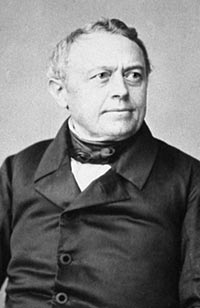Karl Josef von Hefele
Karl Joseph Hefele from ( born March 15, 1809 in Unterkochen, † June 5, 1893 in Rottenburg am Neckar) was a Roman Catholic church historian and third bishop of the Diocese of Rottenburg- Stuttgart.
Life
Karl Joseph Hefele was born the son of a royal -Württemberg ironworks manager 1809 in Unterkochen. His mother was descended from the nobility of officials of the former prince provost Ellwangen. He attended the High School in 1817 Ellwangen, 1825, he entered the seminary in Ehingen one. From 1827 he attended the Wilhelmstift and studied at the University of Tübingen, philosophy, philology and Catholic theology. Hefele in 1833 was ordained a priest. According to various activities, including as a vicar and a high school teacher, he was in 1840 as the successor of his teacher Johann Adam Mohler Professor of Catholic Church history in Tübingen. Together with John Kuhn led Hefele to the ultramontane party in the diocese of Rottenburg, but was transformed in the wake of the revolution after 1848 for Moderate - Ultramontanes.
From 1842 to 1843 he was a member of the voters of the Oberamts Ellwangen in the Second Chamber of the Württemberg Estates. In 1853 he was awarded the Knight's Cross of the Order of the Württemberg Crown, which was connected with the personal titles of nobility. In 1868 he was called by Pope Pius IX. called to Rome to prepare the First Vatican Council. He had the task of drawing up the rules for this meeting. For this he was well qualified, as he had already in 1855 the first volume of his best-known work, the nine -volume History Council published. Six more volumes followed until 1874, the volumes eight and nine were continued 1887/1890 by Josef Hergenröther.
On June 17, 1869 Hefele was elected by the chapter to the bishop of the diocese of Rottenburg. The confirmation of the election by Pope Pius IX. only took place on 22 November 1869. episcopal consecration on December 29, 1869 donated Hefele Archbishop of Freiburg Lothar von bucket.
Immediately after his episcopal ordination broke Hefele on the council, which has already begun. As council participants, he was among the minority that rejected the dogma of the infallibility of the pope, and took over in this group, the historical argument. When the dogma of papal infallibility could not be prevented, he left with other opponents ahead of the council, as they hoped for a later revision limiting; but there was no continuation of the Council. In a statement on April 10, 1871 Hefele finally accepted the decision of the council for the sake of peace. At his death he was reconciled with the authorities of the Church. The experience of the council had yet broken it; shortly before his death in 1893, he destroyed almost his entire literary estate.
Hefele was an honorary member of the Catholic Student Association AV Guestfalia Tübingen in the CV. The problem associated with the Episcopate mandate in the Second Chamber of the Diet in Stuttgart he had always rest.
His final resting place he found in the tomb of Bishop Cemetery Church Sülchen.
Works
(Selection)
- History of the introduction of Christianity in southwestern Germany, especially in Württemberg, Tübingen 1837 ( digitized )
- The Cardinal Ximenes and the ecclesiastical states of Spain at the end of the 15th and at the beginning of the 16th century, Tübingen 1844, 2nd edition Tübingen 1851 ( digitized )
- Conciliengeschichte. First volume, Tübingen 1855 ( digitized )


.jpg/220px-P_Sinner_-_Bischof_Karl_Joseph_Hefele_1869_(GPh43).jpg)







